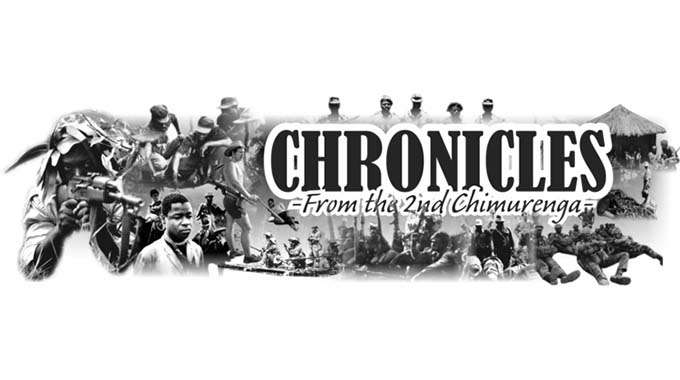
The Sunday Mail

HE is a man who saw it all during the liberation struggle as a trainer, commander and fearless fighter. This week, we begin to chronicle the story of Cde RICHARD CHIRONGWE (RC), who is presently secretary-general of the recently created ZANU PF War Veterans League. In this first instalment, Cde Chirongwe tells our Political Editor KUDA BWITITI (KB) about his early life and how, as a teenager, he witnessed an act of senseless brutality by a Rhodesian soldier.
********************
KB: Cde Chirongwe, thank you for taking time to speak with us. Please, give us details about your early life.
RC: I was born on September 24, 1959 in Mbare, which was my first home. My late mother’s name is Mabel Richards. She was of mixed race. My late father’s name was Peter Chirongwe. I was born at Harare Clinic, which was located between Mbare and Ardbennie. My mother worked for several institutions, including the then Rhodesia City Council, where she later held a managerial post. My grandfather, Mr James Richards, had worked for Thomas Meikles, a top businessman, so my maternal family was well-networked.
In the 1940s, my father first worked in Chipinge for the King George family. One of the Rhodesians he worked for taught him photography. When this white man decided to leave the country, he left all his cameras and photographic equipment with my father.

Cde Chirongwe
As such, my father became one of the first black professional photographers in Rhodesia. He had all the modern equipment of that era to clean and produce the pictures, so he proceeded to put up a photo studio in Mbare, near Stodart Hall, with his partner named Mukwebeya.
KB: Where did you attend school?
RC: I did my early primary education at Ardbennie Primary School, as my maternal grandparents had a house in that suburb. Ardbennie was a predominantly coloured community, and I was one of the few kids who was not coloured. Later on, I moved to Nyandoro Primary School in Highfield, where my father had acquired a house, as his photographic business was really booming, while my mother was also gainfully employed.
My father was able to set up another photo studio in Highfield. He also had another photo studio on Cameroon Street in the CBD (Central Business District).
KB: Did the shift from Ardbennie to Highfield have an impact on you?
RC: What is interesting is that when we moved to Highfield in the 1960s, my father’s business grew even more. Highfield was home to nationalists such as Ndabaningi Sithole, Enos Nkala, Robert Mugabe and Joshua Nkomo, who all had houses there. So, my father became the photographer for all these luminary figures. He took many important pictures. These top names became his friends.
Several pictures that we now see in history books came from my father’s camera. Whenever he took his pictures, he would bring them home. So, as a young man, it was awesome to see the pictures.
Later, when most of these nationalists were sent to prison, my father would then take time to reminisce about the time he spent with these high-profile figures. This, thus, became a sort of political orientation for me, in terms of understanding the role that such nationalists were playing in fighting colonial oppression.
Another positive thing was that, having been brought up in the coloured community in Ardbennie, my English was very good and at Nyandoro Primary School, I excelled in my studies so much that I was able to skip classes.
I then proceeded for my secondary education at St Ignatius College in Chishawasha in, I think, 1970. I was one of the youngest learners at St Ignatius, since I had skipped several grades. After I finished my studies at St Ignatius in 1974, there was an incident that occurred in Highfield, which changed my life for good.
KB: Tell us about this incident.
RC: I was just outside the vending market in Highfield when I witnessed a horrifying occurrence. You see, Rhodesian officers had a habit of harassing black people at the markets.
Whenever they arrived with their vehicles, they expected all vendors to flee. Anyone who did not leave would be beaten up or taken for questioning. On that particular day, there was one vendor who remained behind. I think he did so because he realised that it was too late to leave, as the officers had already invaded the place.
However, the officers saw this as a show of defiance. A Rhodesian officer instructed one of his constables, who was a black man, to shoot at the vendor. However, the black officer was hesitant and the white officer went ahead to take out the gun and shoot the vendor. I was the only witness to this shooting because I was standing just outside the market, watching all this unfold.
I stood for several seconds in disbelief.
After some moments, the shooter looked in my direction. Suddenly, our eyes met. He realised that I had seen everything. I knew at the moment that I had to flee from the scene.
The Rhodesian forces were known for their brutality and I imagined they could easily kill me, too, just for being a witness to their brutality. So, I ran away from the scene, passing through the houses in Highfield. However, they were in hot pursuit.
Do not miss next week’s instalment, as Cde Chirongwe continues his narration.



